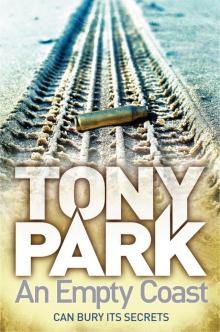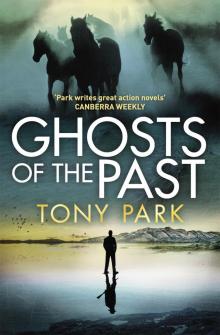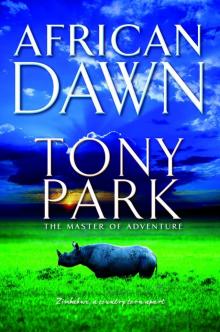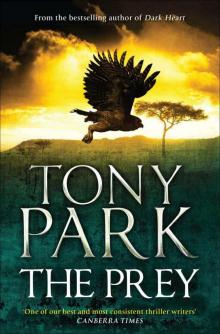Ivory Read online
Tony Park was born in 1964 and grew up in the western suburbs of Sydney. He has worked as a newspaper reporter in Australia and England, a government press secretary, a public relations consultant and a freelance writer. He is also a major in the Australian Army Reserve and served six months in Afghanistan in 2002 as the public affairs officer for the Australian ground forces. He and his wife, Nicola, divide their time between their home in Sydney and southern Africa, where they own a tent and a Series III Land Rover. He is the author of Far Horizon, Zambezi, African Sky, Safari and Silent Predator.
www.tonypark.net
Also by Tony Park
Far Horizon
Zambezi
African Sky
Safari
Silent Predator
IVORY
TONY PARK
First published 2009 in Macmillan by Pan Macmillan Australia Pty Limited
1 Market Street, Sydney
Copyright © Tony Park 2009
The moral right of the author has been asserted.
All rights reserved. No part of this book may be reproduced or transmitted by any person or any entity (including Google, Amazon or similar organisations) in any form or by any means, electronic or mechanical, including photocopying, recording, scanning or by any information storage and retrieval system, without prior permission in writing from the publisher.
National Library of Australia
Cataloguing-in-Publication data:
Park, Tony, 1964–.
Ivory / Tony Park.
ISBN 9781405039536 (pbk.)
A823.4
The characters and events in this book are fictitious and any resemblance to real persons, living or dead, is purely coincidental.
Typeset in 11/15 pt Birka by Post Pre-press Group, Brisbane
Printed by McPherson’s Printing Group
Cartographic art by Laurie Whiddon, Map Illustrations
Papers used by Pan Macmillan Australia Pty Limited are natural, recyclable products made from wood grown in sustainable forests. The manufacturing processes conform to the environmental regulations of the country of origin.
These electronic editions published in 2009 by Pan Macmillan Australia Pty Ltd
1 Market Street, Sydney
The moral right of the author has been asserted.
All rights reserved. This publication (or any part of it) may not be reproduced or transmitted, copied, stored, distributed or otherwise made available by any person or entity (including Google, Amazon or similar organisations), in any form (electronic, digital, optical, mechanical) or by any means (photocopying, recording, scanning or otherwise) without prior written permission from the publisher.
Ivory
Tony Park
Adobe eReader format: 978-1-74198-629-7
Online format: 978-1-74198-573-3
EPUB format: 978-1-74198-741-6
Macmillan Digital Australia
www.macmillandigital.com.au
Visit www.panmacmillan.com.au to read more about all our books and to buy both print and ebooks online. You will also find features, author interviews and news of any author events.
Contents
Cover
About Tony Park
Also by Tony Park
Title page
Copyright
Dedication
Chapter 1
Chapter 2
Chapter 3
Chapter 4
Chapter 5
Chapter 6
Chapter 7
Chapter 8
Chapter 9
Chapter 10
Chapter 11
Chapter 12
Chapter 13
Chapter 14
Chapter 15
Chapter 16
Chapter 17
Chapter 18
Chapter 19
Chapter 20
Chapter 21
Chapter 22
Chapter 23
Chapter 24
Chapter 25
Chapter 26
Chapter 27
Chapter 28
Chapter 29
Chapter 30
Chapter 31
Chapter 32
Chapter 33
Chapter 34
For Nicola
Prologue
It was early on the morning of his fifth birthday that he saw his first elephant, and for as long as he lived he would never forget that moment.
The mist hung low over the plains, and stretched as far as he could see as he peered over the black dashboard of the Land Rover. The vinyl still gave off that oily new smell when the sun slanted in through the square windows, as it did now.
‘Ponha o seu casaco novo, Alexandre,’ his mother said. Even though it was still cold, he didn’t want to pull on his new jacket. Reluctantly, he let his mother pull the scratchy garment over his arms and button it. The coat was a birthday present, but so too was his shiny new toy Land Rover – an identical miniature of his father’s Series IIA. He wanted to play with the car, but his father kept telling him to look for animals.
‘Ai, não pareces elegante?’ his mother said, but Alex didn’t think he looked smart at all.
‘Come here, Alex,’ his father said. ‘It’s time you learned how to drive.’ His father always spoke English and his mother Portuguese. It had always been that way and he answered each in their respective tongue. At five he was fluent in both languages, and thanks to his friend Jose, whose father worked for Alex’s father at the hotel, he had a good command of the local African language, Xitswa, too.
He dropped his toy car and clambered onto his father’s lap. He gripped the steering wheel and squealed with delight when his father let go.
‘Donald!’ his mother shrieked.
‘The boy’s doing fine. Look, Alex.’
‘Buffalo,’ Alex said proudly. He had seen a herd yesterday when they had arrived at the national park. His father had said there were at least a thousand buffalo in the herd, scattered like black marbles across the close-cropped green grass of the floodplain. This one was by himself, though, and he loomed out of the thinning mist like a black ghost.
‘Good boy, steady as she goes. He won’t hurt us.’
Alex turned to watch the huge head with its curved horns that seemed as long, from tip to tip, as he was tall. The steering wheel bucked and turned in his tiny hands as the tyres bounced in and out of ruts and the embedded footprints of animals that had churned the road to mud during the last rains and since dried as hard as pitted concrete.
‘Maybe we’ll see some lions today,’ his father whispered in his ear. ‘In the wild this time.’
Alex growled in imitation of the caged beast he had seen in Vilanculos, awaiting shipment to Portugal. His father had said it was bad to keep wild animals in cages, but his mother had scoffed and said there were far too many lions in Africa as it was and they should all be shot or shipped to zoos around the world.
‘Olha, elefantes!’ his mother called.
His father took back control of the steering wheel and slowed the Land Rover to a stop. Alex turned and caught sight of the elephants. The nearest was barely twenty metres away. Alex climbed off his father’s lap and onto his mother’s as she was closer to the great grey beast. His father killed the engine.
‘It’s a female. She could be the same age as you, my boy, judging by those thin little tusks.’
The elephant turned, startled, shook her head and raised her trunk, sniffing the air. Alex reached out of the open window, but his mother snatched his hand back inside. He heard a funny sound like a tummy rumble, but much, much deeper.
‘They’re talking to each other,’ his father said.
She was the biggest thing he had seen in his young life and he stared at her in silence, drinking in every detail of her wrinkled grey
body. The huge head, the white tusks that shone pale gold in the growing light, the hairy tuft at the end of her tail and the pink mouth that seemed to smile at him. He found it hard to believe that she was only five, like him. ‘What’s wrong with her ear, Papa?’ There was a large v-shaped rent in the left one.
‘I don’t know, my boy. Perhaps a lion tried to catch her when she was a baby. If so, she’s a very lucky elephant indeed.’
‘Can a lion kill an elephant, Papa?’
‘Only a little one. Once they’re this big they’re safe from everything in the wild, except man.’
‘What do you mean, Papa?’
‘People are killing elephants all over Africa, Alex, for their tusks, and it’s wrong. We need to protect these animals. They’re the future of our country – your future, Alex.’
Alex’s mother said, in Portuguese, that there were more things in Mozambique to worry about than people hunting elephants, and that his father should not fill the boy’s head with such serious words on his birthday. Alex let the conversation flow over him and continued to stare, open-mouthed, at the elephant with the tear in her ear.
The elephant started to walk towards them. His mother told his father to start the engine, but his father shook his head. ‘She won’t hurt us. She’s made the decision to approach the vehicle – we’d only be in trouble if we were invading her territory.’
‘Donald!’ his mother hissed, unconvinced.
Alex could feel his heart beating in his chest and he looked back over his shoulder at his father, who smiled at him and winked. His mother put her hands over her eyes and scrunched down so that her head was below the level of the dashboard. Alex wriggled off her lap so that he was next to the door and reached his hand out of the window again.
As the elephant drew closer, he could see the tip of her trunk was pink and that rather than being flat like a pig’s snout, it had two protrusions, like funny little fat fingers. Alex could smell her musty scent and see her long eyelashes and the glistening eye that watched him.
He held his hand steady and felt the soft exhalation of warm breath on his palm as she kissed him.
1
Southampton, England
The overheated interior of the security minivan in which Jane was driven across the dock stank of the driver’s body odour, and the cigarette he’d obviously been smoking before she got in. The relief she got from opening the sliding door was short lived, and the wind and rain lashed her while she struggled to drag her rucksack and day pack out. The driver had no intention of leaving his seat to help her, and was probably looking forward to relighting his smoke. Her strawberry blonde hair was plastered to her face and rivulets cascaded off the collar of her Gore-Tex parka and down the back of her neck. The bleak day matched her mood. There was no band, no streamers, no crowds of well-wishers, no tearful farewells. Just row upon row of brand-new Land Rovers, awaiting loading on a car carrier.
Her ship loomed above her. At nearly four hundred metres in length, the one hundred and thirty thousand tonne MV Penfold Son was hard to miss. The last of its cargo of twelve thousand steel shipping containers was being loaded by a giant crane on the dockside. It was one of the largest container ships afloat and just within the Suezmax specifications that allowed it to squeeze through the Suez Canal. It was an impressive beast, this flagship of a family-owned line; however, Jane didn’t like to think of the word family when she thought of the name Penfold. It made her feel bad, and she wasn’t, she told herself for the third time that morning, a bad person. Was she?
The man at the top of the gangway stared down at her as she walked up. Pale-faced and gaunt, with lank, greasy, greying hair that protruded from under his white plastic hard hat, he wore a blue boiler suit and orange safety vest.
He wiped his nose and sniffled as he took her passport from her and opened it. ‘Jane Elizabeth Humphries. You are from head office, da?’
‘Yes.’
‘Welcome aboard.’ He made a note on a clipboard and handed back her passport.
She thought it a talent of the man to make the word welcome sound like an insult.
‘I am engineer, Igor Putin. Name is like former president. I show you to your cabin. Come.’
Another crewman, who looked Filipino, appeared and Putin handed him the clipboard. The man nodded and smiled at Jane, and took over Putin’s position at the top of the gangway.
Jane wiped wet hair from her eyes and followed the Russian officer down the narrow passageway. From somewhere far beneath her came the throb of the ship’s engines, vibrating up through the deck into the soles of her feet – a far more pleasant sensation than following in Igor’s wake, which smelled of cheap aftershave and body odour.
‘You are lawyer, yes?’ Igor said without turning around to face her.
‘Yes.’ She’d heard all the jokes and aspersions before.
‘I have just got divorced from Englishwoman. I don’t like lawyers. No offence.’
‘None taken.’ She didn’t like smelly Russians either, but thought it wise not to upset the crew too early in the voyage.
Igor showed her to the owner’s cabin. This was the crème de la crème of accommodation on board a working freighter. She’d seen pictures, but this was her first time on board one of the company’s ships, though not her first cruise.
Jane hated flying. It terrified her, so she did everything – anything – she could to avoid it. If she was required to be in Paris for a business meeting on a Monday morning, she would book herself onto the Eurostar train on the Sunday afternoon and stay in a hotel, rather than risk her life on a forty-five minute flight.
She holidayed in England – something that had annoyed and, in two cases, eventually alienated past boyfriends – or took cruises. She’d been around the Mediterranean and Aegean and taken a cruise to Sydney and back on board the Queen Mary. She was still paying off the credit card bill from the last voyage, but that was a small price to pay, she reasoned, compared to plunging thirty thousand feet to her death.
Jane considered herself something of a seasoned sea traveller, though this would be a new adventure for her.
The owner’s cabin was actually a two-room suite – a bedroom and small sitting room, with an ensuite shower and toilet. She knew it to be thirty square metres and that turned out to be about as big as a very small London flat, minus the kitchenette. There was a double bed, a bar fridge, a television with a VCR and DVD player, an AM-FM radio and an electric kettle and tea and coffee supplies on a small sideboard.
The cabin was immediately below the navigating bridge and faced forward. Through thick glass windows she had a fantastic view across the expanse of stacked shipping containers. At least the view would be fantastic when the rain cleared, she thought.
When she opened the fridge she saw six bottles of vintage Krug champagne and a punnet of strawberries. She closed the door and smiled. As she unpacked she reflected on the last two weeks at work and the way her life had been thrown into disarray.
It had been clear to her, not long after she started her new job nine months earlier, that the managing director and future owner of Penfold Shipping, George Robertson Penfold, wanted to sleep with her.
As the in-house counsel for the London-based international shipping firm, Jane could have reeled off a dozen legal and moral reasons why this would have been a bad idea, starting with the fact that George was married and had three teenage children. Had she been minded to take his increasingly unsubtle advances in a different way, she could have mounted a good case for sexual harassment. However, Jane had been attracted to George from the moment she’d entered his city office for her job interview.
He was tall, fit – he ran seven kilometres and did a hundred push-ups a day – handsome, rich, urbane, funny, intelligent and well read. At forty-five he was young to be the MD of a company with a profit of several hundred million pounds per annum.
Of course, it didn’t hurt that his father was chairman of the board, but George was a man who quite clearly c
ould have been running a similarly sized business on his own merits. Indeed, according to company legend, he had done everything in his power not to inherit the business from his father.
George had run away to sea – literally – bunking out of private school at the age of sixteen to work for a rival shipping company. Being the scion of one of Britain’s elite shipping families had not helped him on board a rival’s vessel; in fact, it had proved a curse for his first few years. He had defended himself and his family name – even though he had earned his father’s wrath – in a series of fist fights in ports around the world.
According to George, it had been his wife, Elizabeth, who had talked him into returning to the family fold. By then George was twenty-five and had more than earned his right to serve as an officer on one of his father’s ships. He’d risen to captain by the age of thirty-five – no mean feat at the time – and there were few in the industry who would suggest he’d made the rank of Master Mariner by virtue of anything other than merit.
But George missed the sea, or so he’d told Jane when he’d first taken her out for a long weekend on the company yacht. There had been others aboard – the IT manager and chief financial officer – but George seemed to engineer quiet moments when it was just the two of them together. Elizabeth, George said, hated the sea and anything to do with ‘boats’, as she insisted on calling them. She liked his family’s money, George said, but not the family business.
He also suspected Elizabeth was having an affair.
Jane had been shocked to hear him make such a private admission to her. The other members of the executive team were ashore, enjoying wine and seafood in the French port in Brittany. Jane, who loved sailing, had willingly volunteered to stay behind and help George secure the yacht. Their work done, George had opened two chilled Czech pilsners, which they drank in the slanting afternoon sunshine.

 The Cull
The Cull Blood Trail
Blood Trail Red Earth
Red Earth An Empty Coast
An Empty Coast Dark Heart
Dark Heart African Sky
African Sky The Delta
The Delta Captive
Captive Ivory
Ivory Ghosts of the Past
Ghosts of the Past Captive_A High-octane And Gripping African Thriller
Captive_A High-octane And Gripping African Thriller Zambezi
Zambezi Silent Predator
Silent Predator Far Horizon
Far Horizon African Dawn
African Dawn The Prey
The Prey Safari
Safari